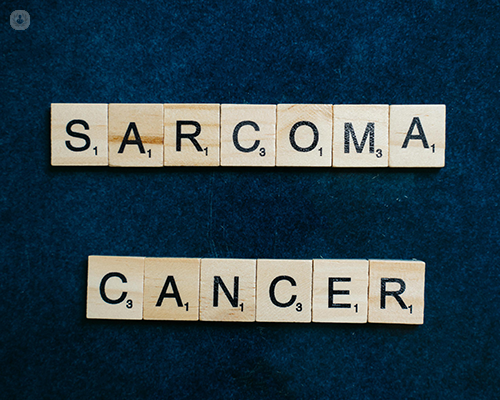Sarcoma: Early detection, diagnosis, and care
Written in association with:Sarcoma is a complex disease, but early diagnosis, effective treatment, and long-term follow-up care can help to improve outcomes.
Mr Robin Pollock, renowned consultant orthopaedic surgeon, provides an expert insight into sarcoma, including what it is, how it is diagnosed, and what can be expected in terms of treatment and follow-up care.

What is sarcoma?
Sarcoma is a type of cancer that develops in the connective tissues of the body, including muscles, bones, tendons, fat, cartilage, blood vessels, and lymphatic tissues. There are two primary types: soft tissue sarcoma and bone sarcoma. Within these two categories, there are then more than 50 different subtypes, including osteosarcoma, Ewing’s sarcoma, and liposarcoma.
The symptoms of sarcoma can vary depending on its location, size, and growth rate. Often, they can mimic other medical conditions. Some common signs of sarcoma include:
- a lump or swelling
- pain
- stiffness or reduced mobility
- unexplained fatigue
- sudden, unexplained weight loss
What are the risk factors for sarcoma?
Sarcoma is a rare cancer and its exact cause is still unknown. However, several risk factors are associated with it, including:
- Genetic mutations: Certain inherited genetic conditions can raise the risk of developing sarcoma. Examples include retinoblastoma, neurofibromatosis type 1, and Li-Fraumeni syndrome.
- Radiation therapy: Patients who have received radiotherapy for other cancers are at a higher risk of developing sarcoma several years after treatment.
- Chemical exposure: Prolonged exposure to specific chemicals, including vinyl chloride, herbicides, or arsenic, can increase the risk of developing sarcoma.
How is sarcoma diagnosed?
Diagnosing sarcoma requires a multi-step approach. The diagnostic process typically starts with a complete medical history and physical examination. The doctor will assess the patient’s symptoms, family history, and any potential risk factors.
If sarcoma is suspected, the next step involves imaging studies to detect and evaluate the tumour. These may include X-rays, MRI, CT scan, or a PET scan. To confirm the diagnosis of sarcoma, a biopsy is also typically required, in which a small sample of tissue is taken from the tumour and examined under a microscope to determine if it’s cancerous.
Once a diagnosis is confirmed, staging is determined to assess how advanced the sarcoma is and whether it has metastasised to other areas of the body. Staging helps in informing treatment decisions and predicting prognosis.
Is sarcoma treatable?
Yes, sarcoma is treatable. Treatment options vary based on the type, location, and stage of the cancer.
Surgery is often the primary treatment for sarcoma, especially for localised tumours. The goal of surgery is to remove the tumour completely, along with a margin of healthy tissue to reduce the risk of recurrence. In cases when sarcoma occurs in the limbs, limb-sparing surgeries are often performed.
Radiation therapy utilises high-energy beams to destroy cancer cells. It can be used before surgery to reduce the size of the tumour or after surgery to kill any remaining cancer cells. In some cases, radiation therapy is used as a stand-alone treatment for patients who aren’t candidates for surgery.
Chemotherapy involves the use of drugs to destroy cancer cells throughout the body. While not always effective for all types of sarcoma, chemotherapy is often used for aggressive or advanced-stage sarcomas, especially in cases of bone sarcoma or when the cancer has metastasised.
For advanced sarcoma, doctors will often combine different treatments (for example, surgery with radiation or chemotherapy) to improve outcomes.
What is the follow-up care for patients with sarcoma?
After completing treatment, follow-up care is essential to monitor for any signs of recurrence and manage long-term health. This process typically includes regular physical examinations, imaging tests such as X-rays, blood tests, and physiotherapy.
The frequency of follow-up visits will decrease over time, but lifelong monitoring is recommended.
If you would like to book an appointment with Mr Robin Pollock, head on over to his Top Doctors profile today.


